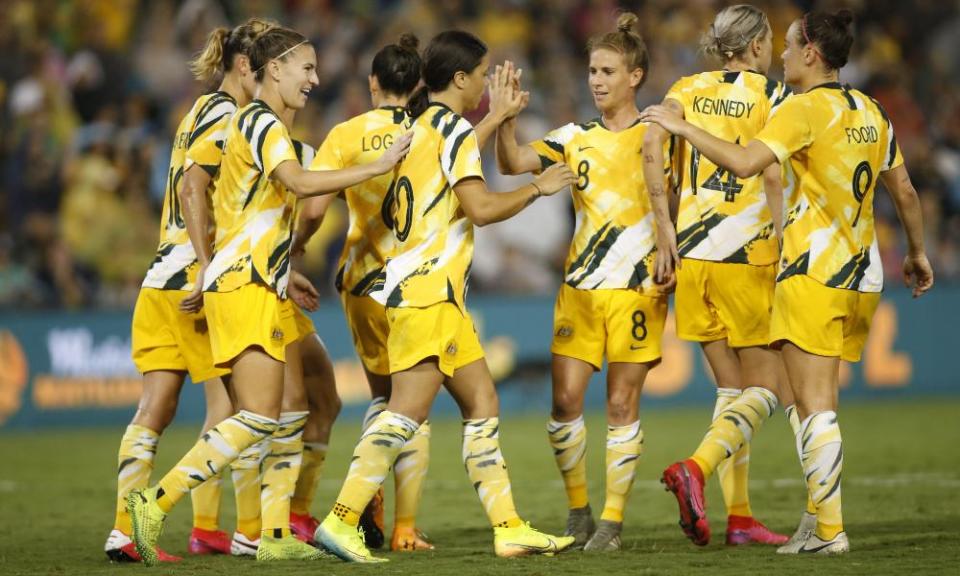Bad timing works in FFA’s favour as hunt for next Matildas coach begins

The sacking of Alen Stajcic as Matildas head coach 18 months ago remains one of the most divisive and largely unresolved issues in Australian football. But for all the rock-throwing it generated, there’s one thing that its various camps can agree upon: it was diabolically timed.
Football Federation Australia’s decision to terminate Stajcic’s contract came just five months before the 2019 Women’s World Cup, where many thought the Matildas would improve upon their 2015 quarter-final finish. They had Sam Kerr, after all.
Related: Matildas forced to look for new coach after Ante Milicic steps down
But the abrupt coaching upheaval and the media firestorm that followed caused major damage to the team as they prepared for France. Despite the players’ claims that they were “blocking it out,” several – including Kerr – admitted later that the stress and chaos of those few months contributed to their disappointing performances and early exit.
It was not that Ante Milicic – parachuted into the role a month after Stajcic’s firing – was not capable of leading the Matildas further. Nor, arguably, were the Matildas incapable of achieving a result more befitting their “Golden Generation” status: the Australian team most likely to win a major football title. It is that neither he nor they were afforded one of football’s rapidly-disappearing luxuries: time.
Time is something that FFA has had an awkward relationship with over the last few years. Although the circumstances were unique, Stajcic was the second of two national team head coach roles that had to be hastily filled following the unexpected departure of a longer-term appointment. In November 2017, Ange Postecoglou resigned as Socceroos head coach. A two-month search led to Dutchman Bert van Marwijk taking over, barely six months out from the 2018 men’s World Cup in Russia.
Australia’s performances in both tournaments weren’t just indicative of the nation’s position in football’s ever-changing global pecking order. It was also a reflection of the poorly-timed off-field events that led up to them.
Ironically, though, it is bad timing that now appears to be working in FFA’s favour. As Covid-19 has barrelled through world football, major tournaments have had to be adjusted or postponed, including the Tokyo Olympics. While Milicic’s Matildas contract originally kept him with the team until the end of the Tokyo Games, at which point he would depart to take over as head coach of A-League side Macarthur FC, football’s warped calendar has meant Milicic was ultimately asked to choose between two roles that would end up overlapping. On Sunday, he chose to honour his club contract and stood down from the national team.
The news was not surprising; Milicic was always meant to be an interim manager, a place-holder while FFA found someone to lead the Matildas over the next four-year cycle. While his decision to leave before the Olympics was not planned, the extra year it frees up has become a blessing in disguise for the governing body who can now take more time searching for his successor.
Not that they will have to search long to find candidates. FFA has four major tournaments in four consecutive years to prepare for: the 2021 Tokyo Olympics, the 2022 Asian Cup, the 2023 Women’s World Cup and the 2024 Paris Olympics. They will do so with one of the most talented women’s teams ever assembled, including several players in the prime of their careers. And the biggest tournament of all – the World Cup – will be on home soil. The Matildas job is, in other words, one of the easiest sells in international football.
Related: Football in Australia is doomed to be a marginal sport unless its leaders show vision | Simon Hill
The luxury of time afforded by the pandemic also allows FFA to more seriously consider some of the role’s deeper questions: what are the pros and cons of an Australian versus an international appointment? Should they be familiar with Australia’s local talent pool in the form of W-League experience, or is familiarity with opponents in overseas leagues more valuable? Should they have already led a nation to major tournament success, or will club dominance suffice? Should coaches from powerhouse nations be preferred to coaches from developing ones? Should experience in the women’s game even be required?
Several names are emerging from the noise including Arsenal’s Joe Montemurro, two-time World Cup winner Jill Ellis and former Canada and AC Milan boss Carolina Morace – all three of whom are understood to be interested. Locally, Mel Andreatta, Jeff Hopkins and Ante Juric have been mentioned, while others further afield such as Jitka Klimkova and Laura Harvey – both of whom have coached USWNT Under-20 teams – could have their sights set on senior challenges.
While bad timing got FFA into this mess, bad timing also appears to be getting them out. The Matildas job is now one of the most attractive in women’s football; it’s up to the governing body to use whatever time they now have wisely.

 Yahoo Sport
Yahoo Sport 





































